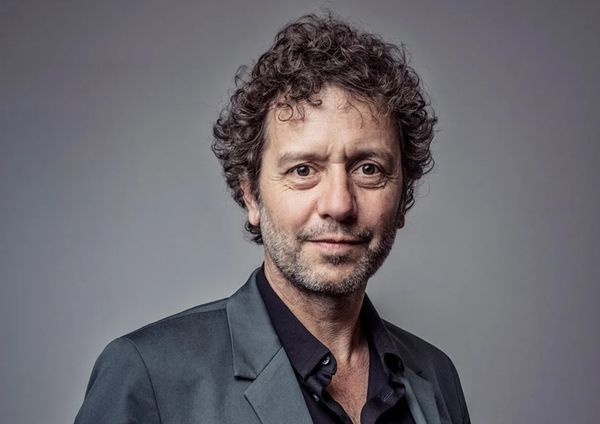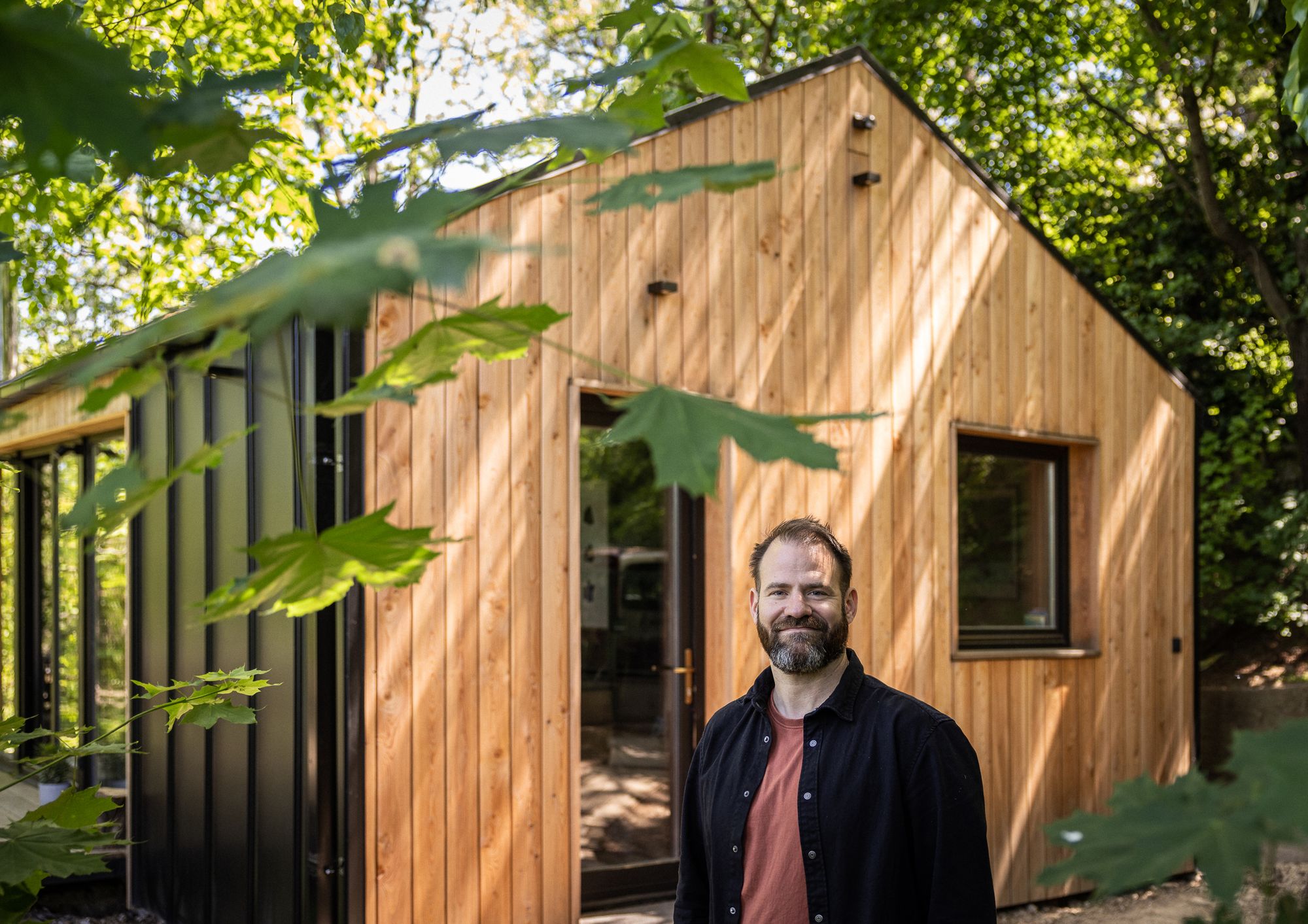Industrial designer Dávid Pataki dreamed up and built his new home in a jungle-like forest in Tahi, 30 kilometers away from Budapest. Accompanied by his French bulldog, Zara, who joyfully runs around the house or lays on the shady terrace. Six months ago, Dávid’s partner, Éva has also moved into the 32-square meter cottage, which practically breathes with the garden. The garden must be heaven on earth with its panoramic view in the summer, and inside, practicality and objects filled with memories are in focus. Here comes the 3rd episode of our series.
On a sunny morning, we roll up in a narrow street in Tahi: at the end of it, we see a classic, yet unconventional tent-roofed house with tiny windows. As we later learn, behind the wooden façade hidden in the greenery lies a marvelous, 32-square meter house. Zara, the French bulldog welcomes us with crazy barking, while Dávid and his partner kindly invite us in, excusing themselves for the dog. The gate is still the old one, and in one corner of the garden, there are piles of old railway sleepers, waiting to be turned into something new, as is usually the case with Dávid’s objects.
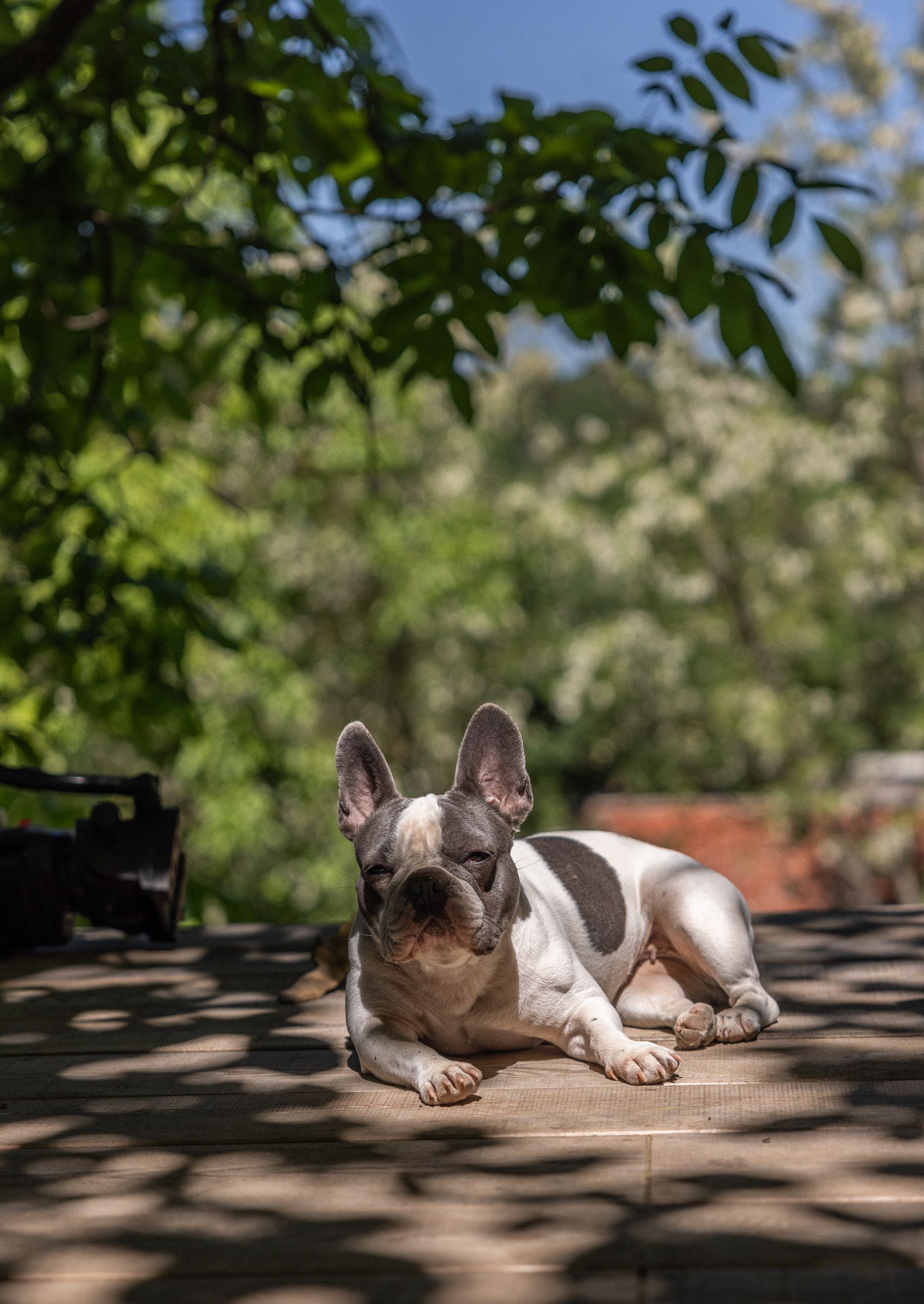
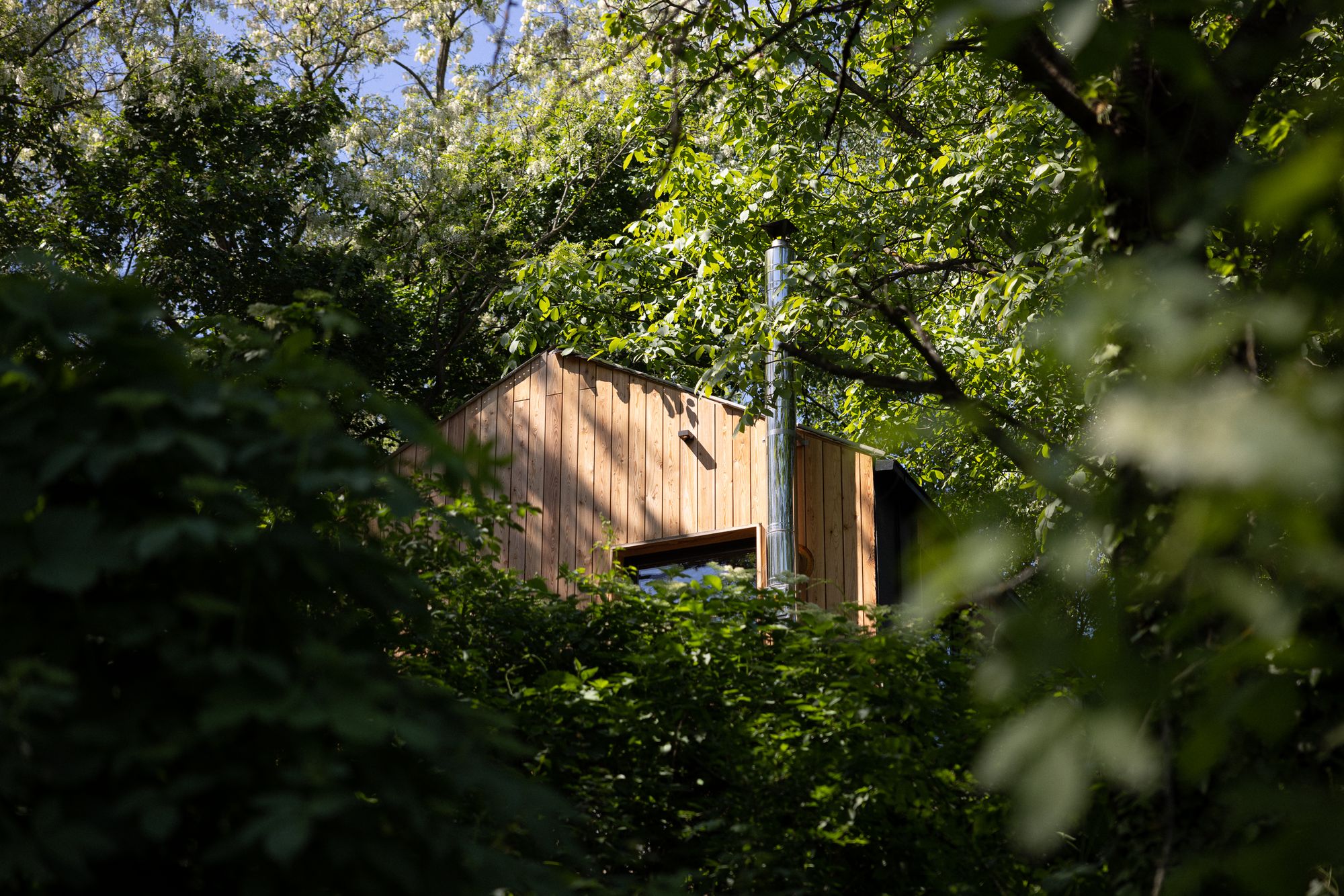
Dávid Pataki graduated from MOME in 2008 as an industrial designer, with a design of a ceiling lamp. His admiration of lighting, lamps, wood, and metal remained—these elements and different kinds of furniture are the basis of the colorful and varied portfolio of his studio founded in 2010, PDSIGN Studio. But there are not only ready-to-use objects in Dávid’s repertoire: sometimes he creates complete furniture based on individual parameters, tailored to the customer’s needs, whether it’s a wine bar or a practical and spectacular shelving system for a showroom. Most recently, for instance, he created beautiful green kitchen furniture for a family home in Antwerp.
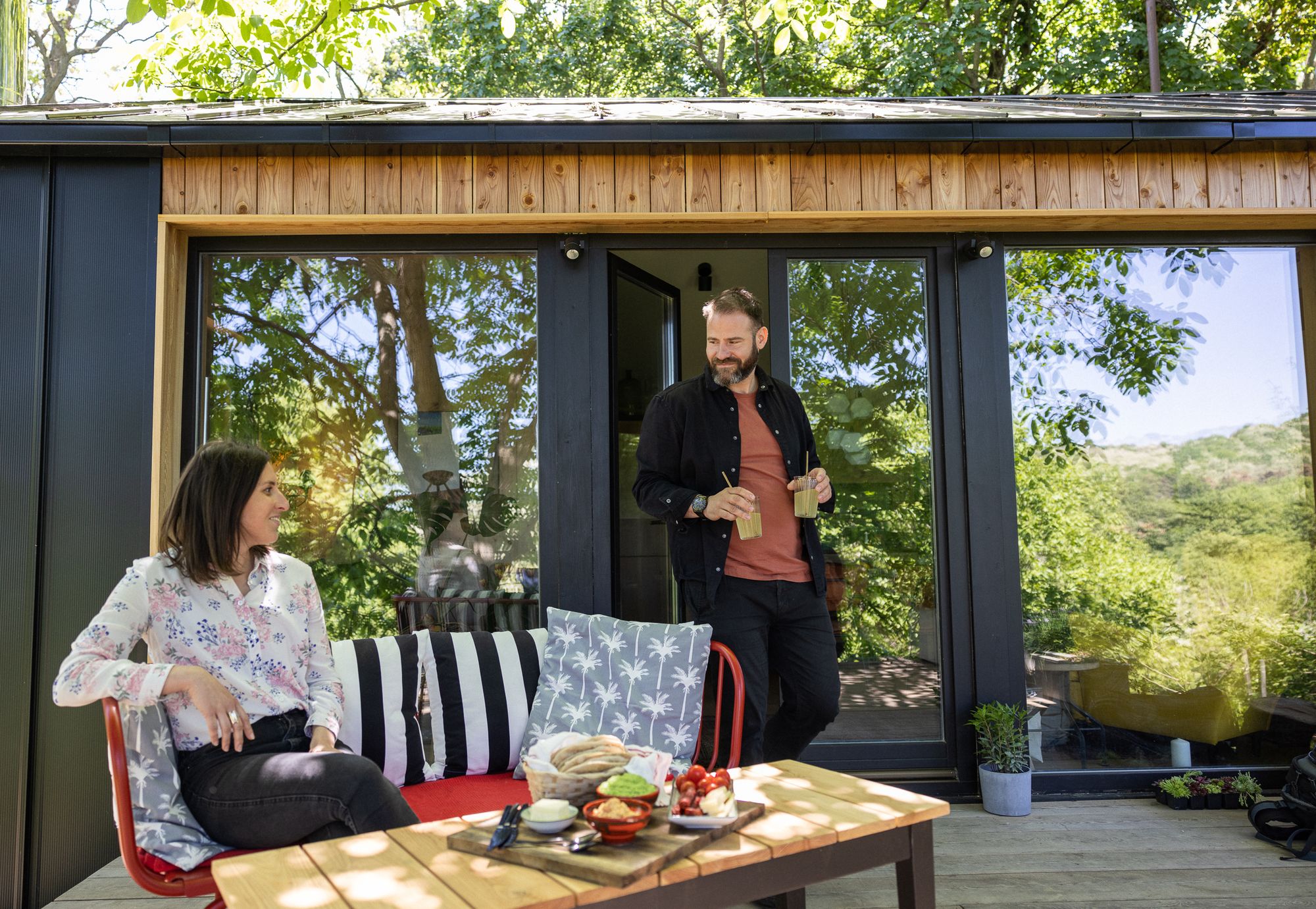
To describe his own objects, Dávid prefers the term ‘saved’ instead of ‘recycled.’ He reimagines timeless leftover wooden materials and creates fantastic cutting boards, coasters, or salad servers, each made unique with a characteristic color. All of these can be found in Dávid’s house, we’ll show them in use, but first: back to the beginnings. How can a designer, who believes in traditions and creates in a contemporary spirit, find a new home in the agglomeration of Budapest?
Dávid says that even though he had always lived in the city, there has always been a voice in the back of his head telling him to spend more time in nature. His parents used to live in a house with a garden in Szeged and his mom loved to be in the garden. The family had a summer house in Lakitelek (where Dávid’s mom comes from), this is where Dávid, his brother Matyi, and their sister Noémi spent their summers, near the Tőserdő forest, by the water, in the shades of trees. His admiration for the mountains grew stronger with time and has peaked now, in the hills of Tahi (climbing up the narrow, often steeply ascending streets, we experienced this for ourselves).
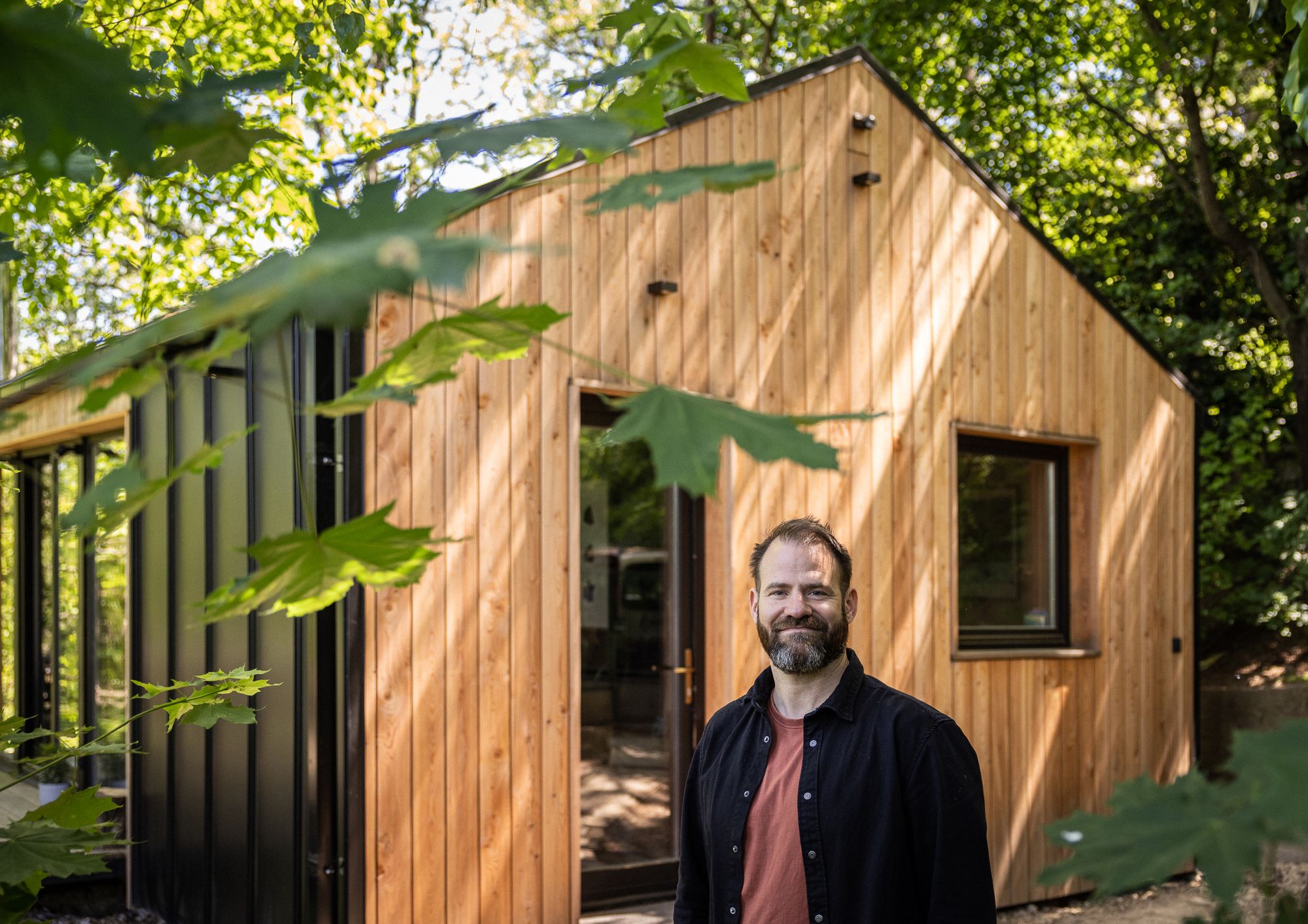
“About three years ago, my life has changed radically, and I asked myself where to go next. I didn’t want a small downtown apartment, and the wish to live in nature grew stronger in me. The fact that I started to hike more and more at that time was probably a contributing factor: I saw these trips as a meditative activity rather than a performance tour. It was then that I wandered into this area and discovered the Danube Bend. At the same time, one of my cousins bought a summer house in Szentendre and turned it into a home—that’s where my imagination really took off,” says Dávid, recalling the early days.
He also did his research on the other bank of the truly popular Danube Bend, primarily looking for houses in a poorer condition, which he could renovate himself. He’s never been interested in ready-made things; he considers himself too critical for that. That’s how he found this site in an advertisement, with the panel-built cottage on it, in horrible condition. The plot looked more like a jungle than a house designed to attract costumers, but Dávid still saw its beauty. He bought the site in August 2020, and a massive eight-month renovation period started. Whenever he could, he came down to continue the construction, he moved in halfway through the process, camped in the garden, and moved officially into the house in April 2021.
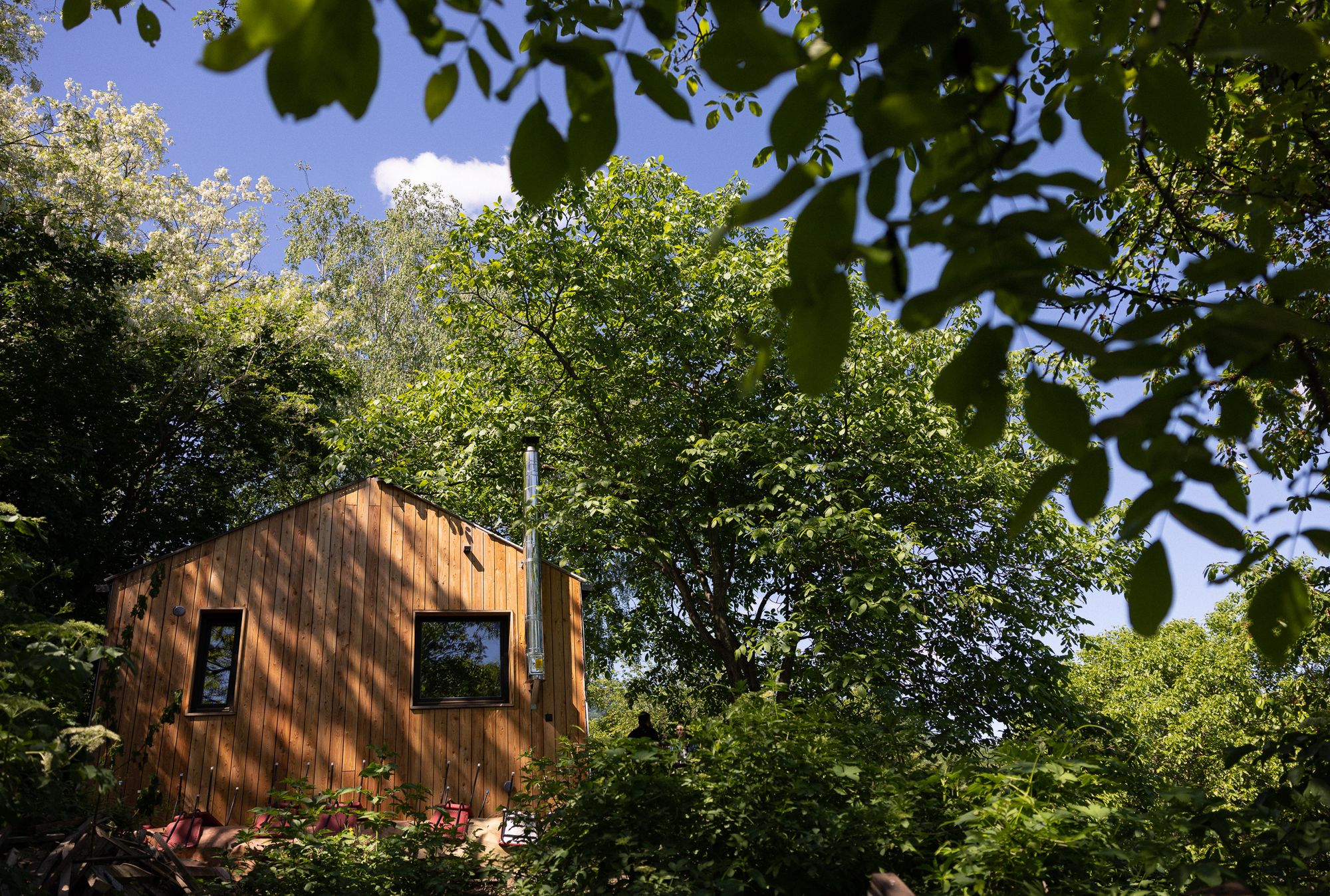
“The former owners started to renovate the house, or mostly took it apart rather than properly renovating it. In that state, it wasn’t even suitable for a summer house, it only had water and electricity installed,” Dávid recalls, while we make our way to the house from the gate. Most of the garden still resembles a lush jungle, but the new minimalist home, which replaced the run-down cottage, gives the property a different vibe. We don’t venture down the steep, moldering concrete steps into the dense bush; the spacious terrace, floating elegantly above the gorge, is inviting us to stay.
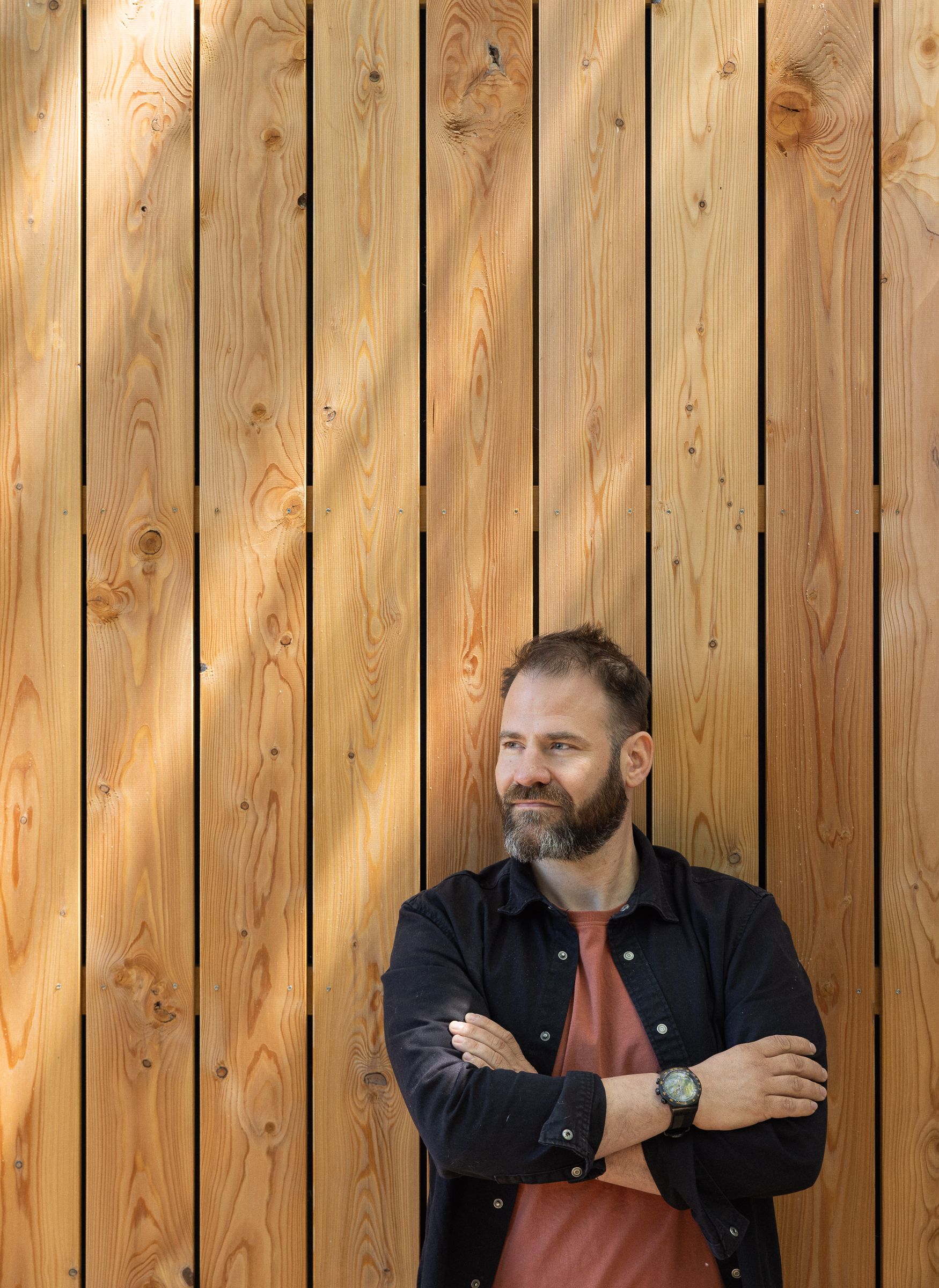
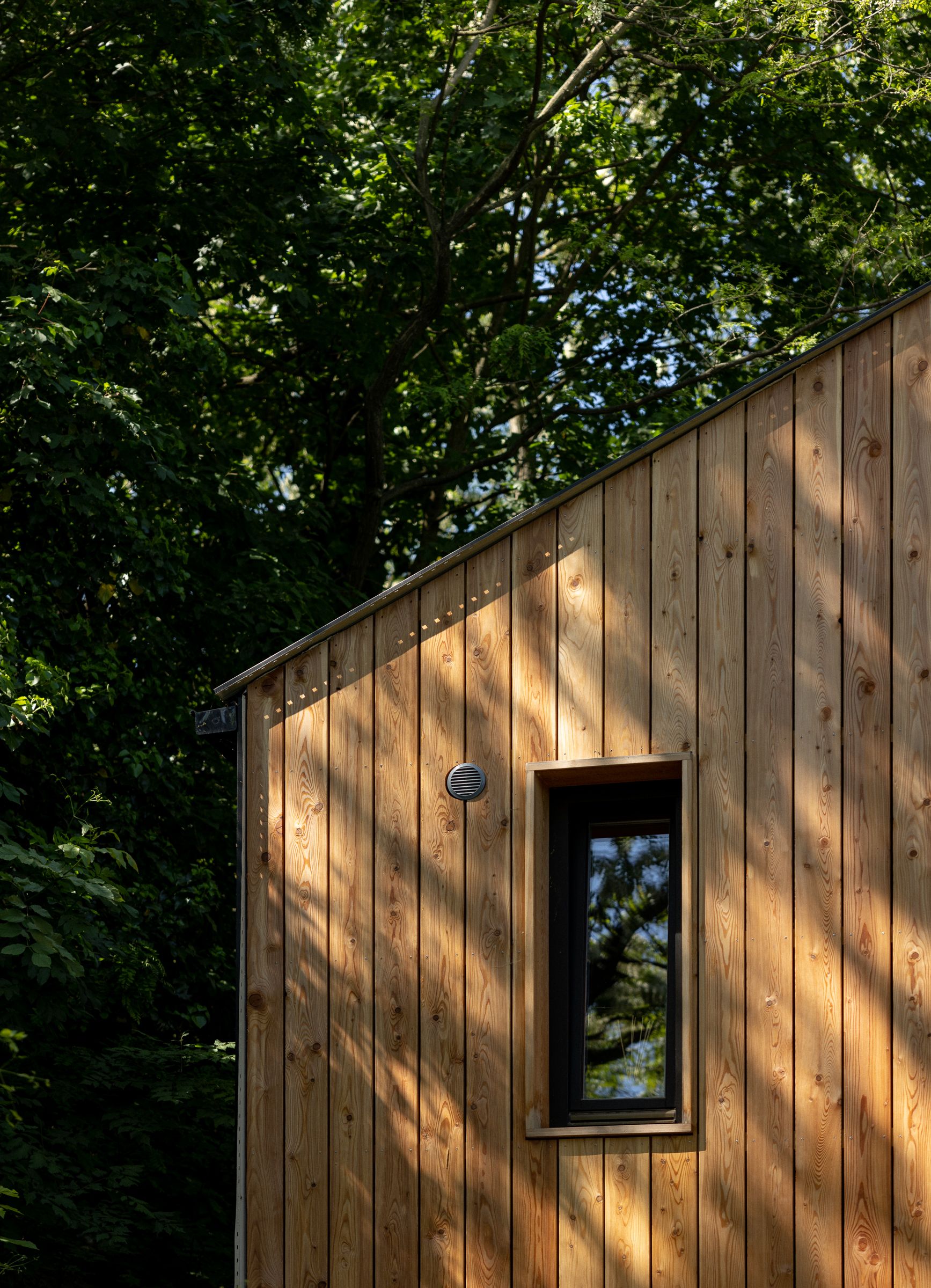
“At first, I was thinking about rebuilding the house completely, I started with strengthening the roof and then moved on to the walls, whenever I had free time or could slip away from the workshop for a couple of hours. The thicknesses of the walls have changed, and the house got a fairly substantial outward-venting insulation. The concrete foundation also had to be repaired,” he says. The location of the old terrace door was unchanged, but because the view from here is so spectacular, a larger glass wall with double terrace doors was installed, so that you can enter the house not only through the front door but also through the terrace—making the house brighter and more spacious. This is undoubtedly the most prominent frontage of the building: the blazing midday sun passes behind the house, while from midday until sunset, it shines from in front of the house—while the birch and walnut trees near the entrance provide a pleasant shade.
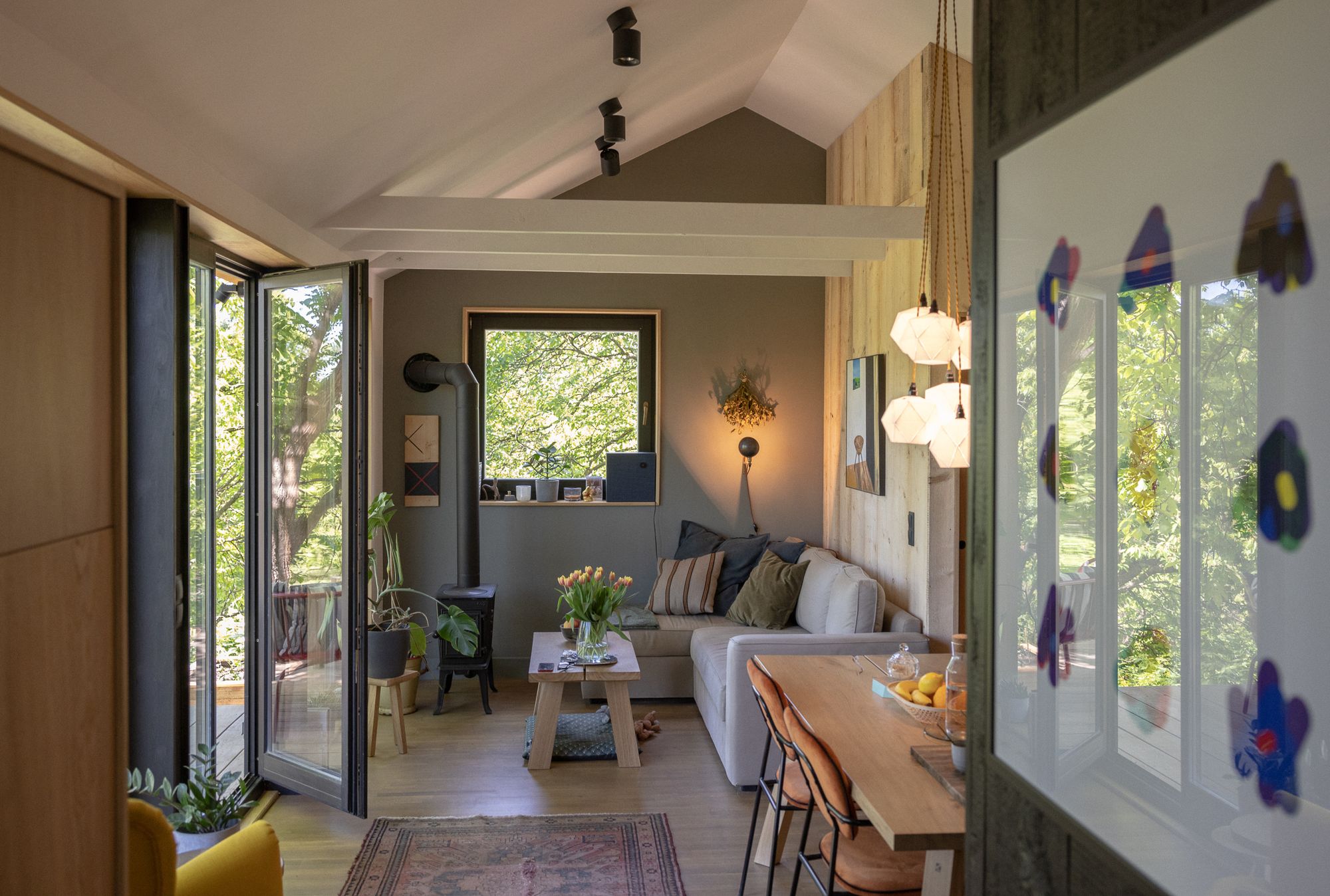
Those 8 months in Dávid’s life were not only about renovating: just when he moved in in April, still without furniture, the whole family got COVID, he went through it in his house, and sadly, a greater tragedy also occurred—Dávid lost his brother to the pandemic, who was also the founder of the Pataki Tiles brand of eye-catching, unique tiles. During this tough, both physically and mentally challenging period, all the things to do around the house helped him move forward: “I lost all my enthusiasm for my job, the house was the only thing that slowly started to inspire me. It helped me get back on my feet, and gave me so many ideas, that I gradually started to want to do other things,” he confesses. At first, his sibling and two cousins helped around the house, but they never asked for extra help from professionals: luckily, they knew two brothers, originally trained as carpenters, who were visiting from the UK because of the COVID troubles, and they were happy to help with the plaster-boarding.
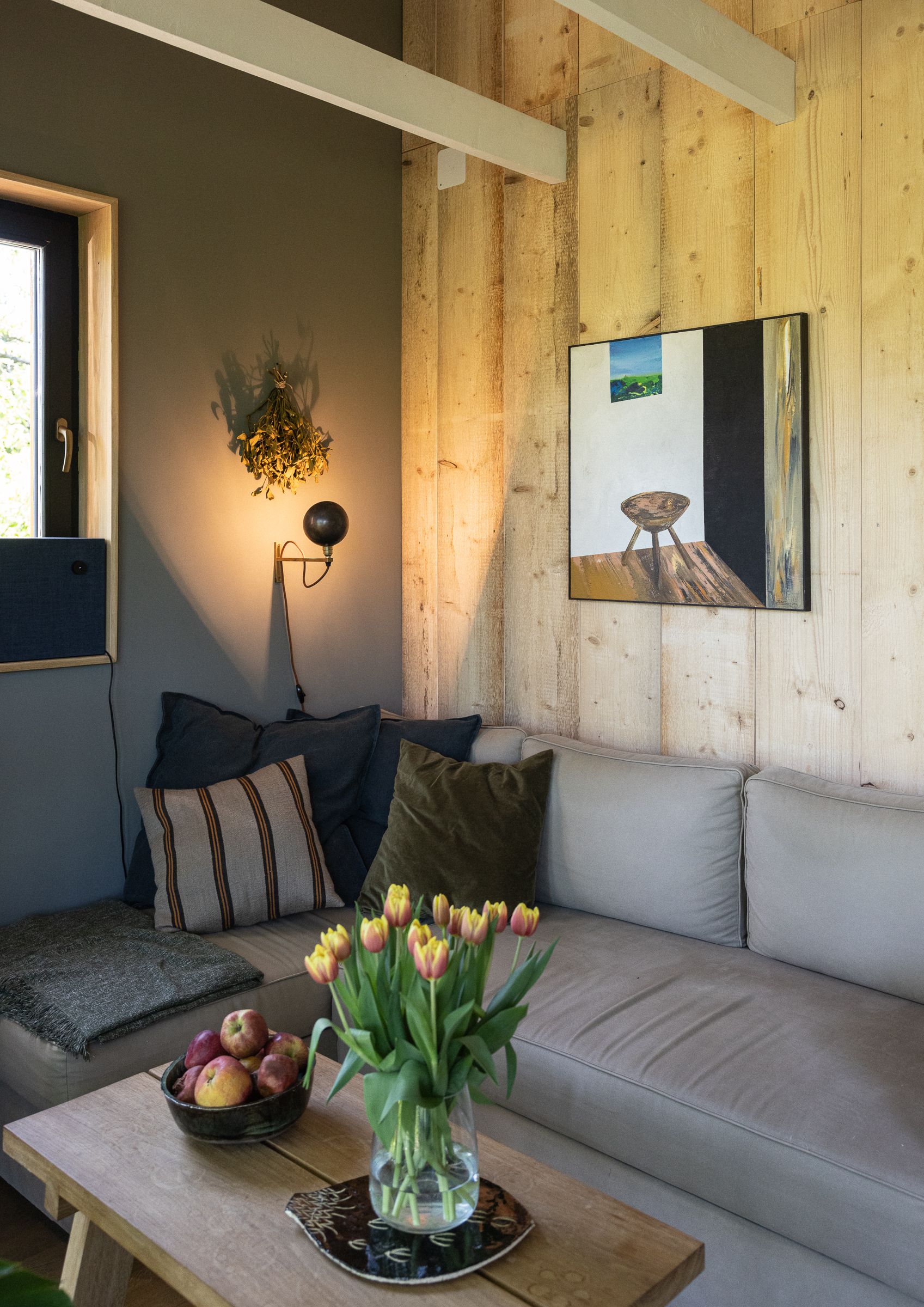

When asked about the renovation, Dávid explains that they had to extend the house by about a meter from the original floor plan and that they also had to rearrange the previous functions: the former kitchen was “freed up” and replaced by a bathroom.
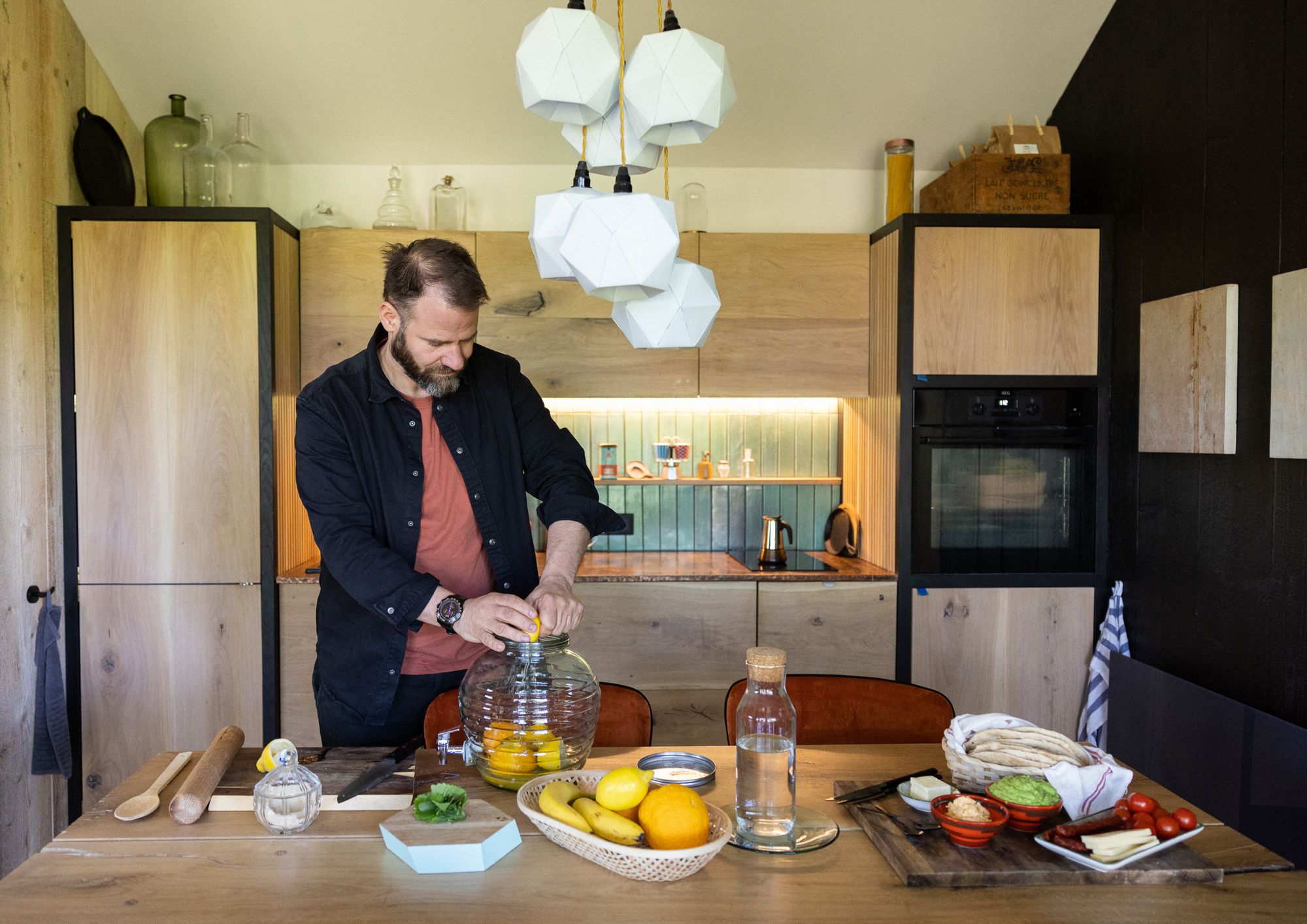
“I find the kitchen to be a very important part of a house, as I really like cooking, I think it has to be a central element. I don’t like hidden kitchens. Obviously, this is an unconventional family house, a perfectly compact, multifunctional little building, where we needed to think smart. This was important from the beginning, and so was having our own separate sleeping bunk,” he shared.
The kitchen was almost entirely done by Dávid, the kitchen units were tailored to fit here, the dining table and the lamp composition hanging above it are also the work of Dávid, and the cheerful tiles of Pataki Tiles have found their place not only here, but also in the bathroom. Dávid is also fond of ceramics—next to the tin box containing paprika, we spot artworks of Judit Lantos, and while drinking our lemonade, we find the colorfully painted cutting boards. The kitchen counter itself is special not only because of its surface but also because of its history—the copper countertop was brought from his brothers’ workshop in Újszentiván (previously part of a bar countertop). “I love it when a material changes with time, always showing a different face. This is absolutely true for copper. A few drops of lemon juice will bite off the oxide, another substance will turn it green. You can see it here and there. But I don’t mind the spots,” says Dávid as he shows the tiny ‘flaws’ of the counter, as he loves these kinds of imperfections.
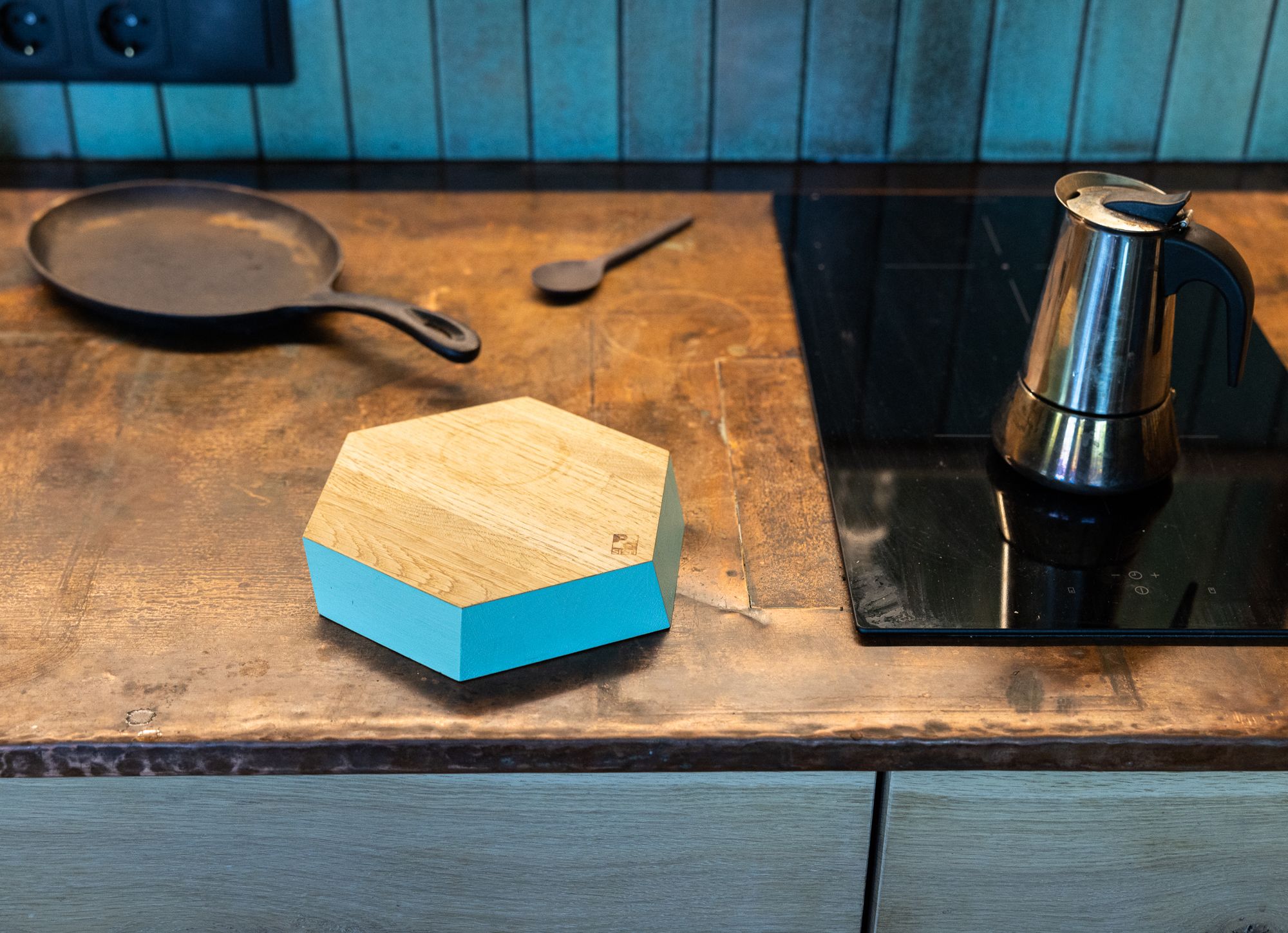
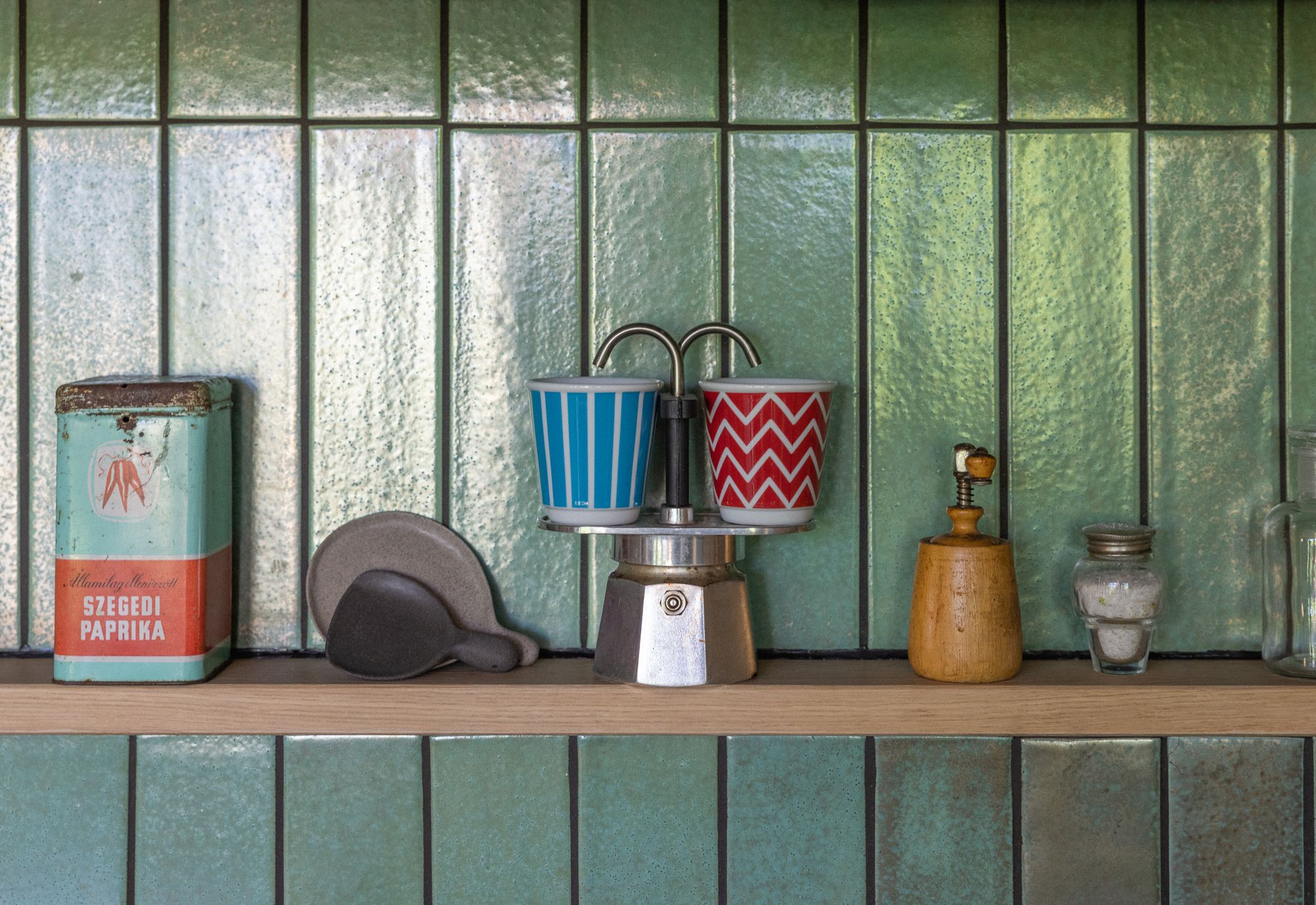
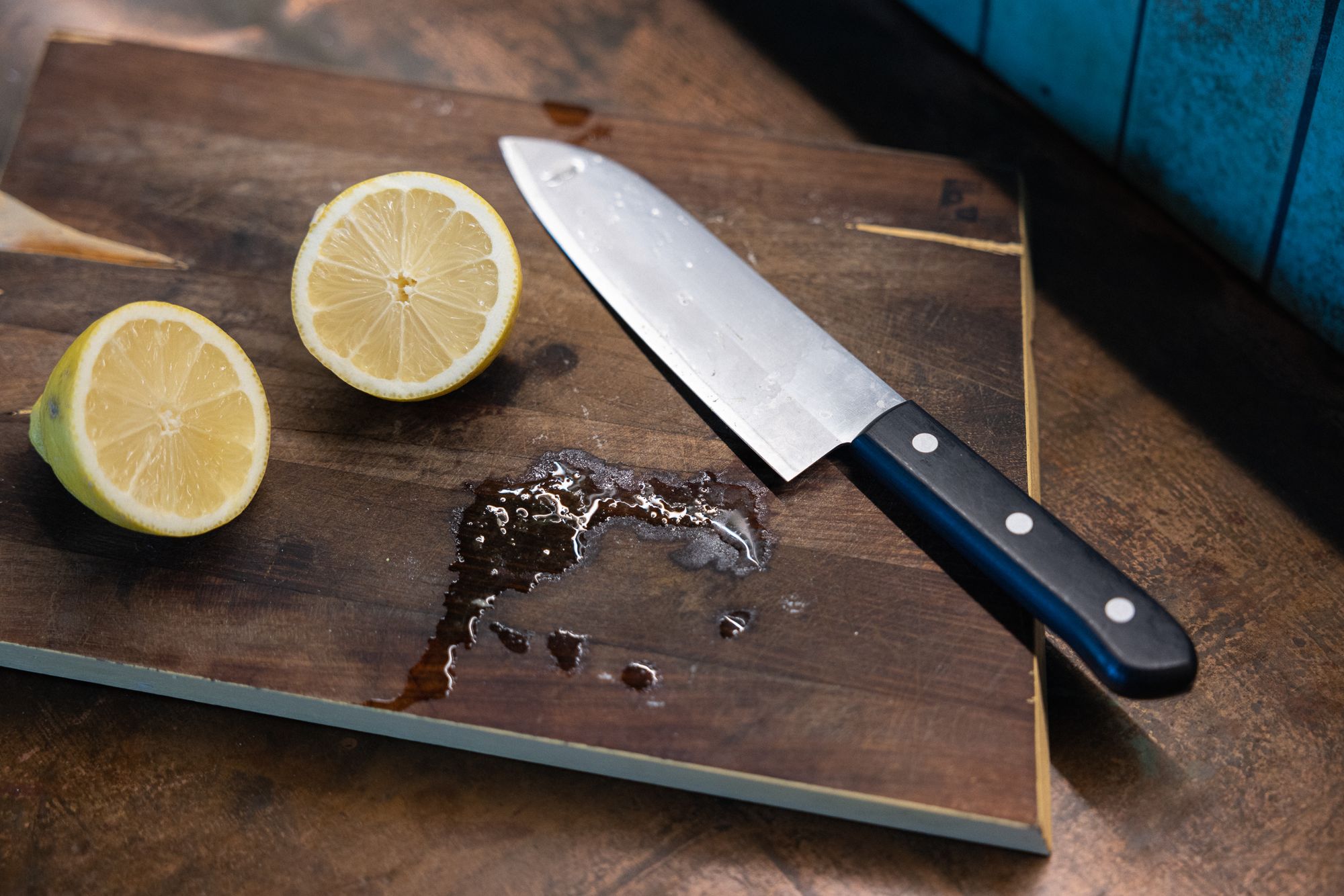
Next to all these unique, handcrafted pieces of furniture, the yellow IKEA armchair resting in front of the terrace door is a nice addition to the room, a birthday present that always reminds Dávid to relax. From here, you have a comfortable view of almost the entire house, there’s no need for a TV with so much to rest your eyes on. A neat little wood-burning cast-iron stove sits in the corner, that helps to fight off the winter chill (the heating is provided by a Norwegian heating panel, which is perfectly adequate for a house of this size).
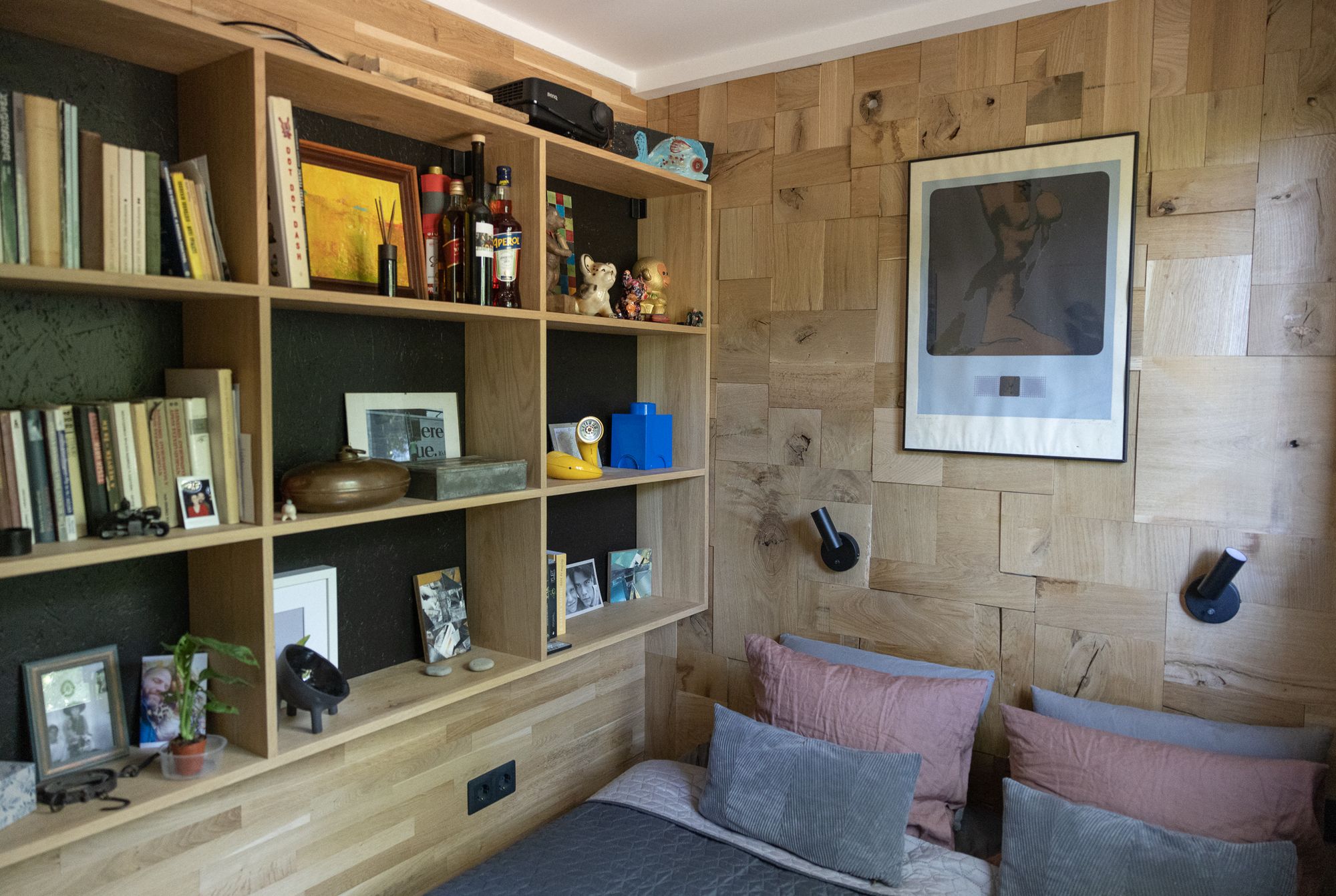
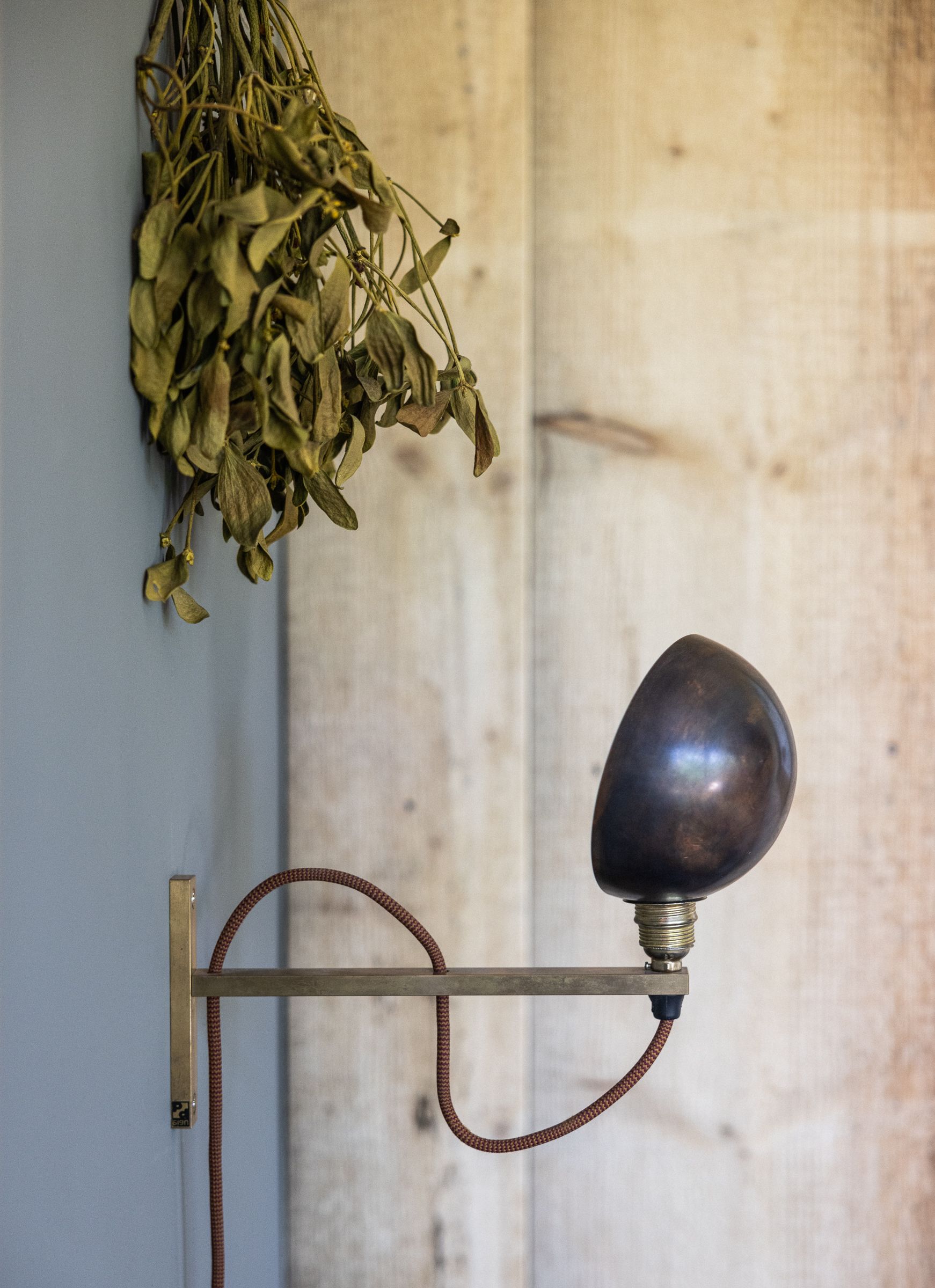
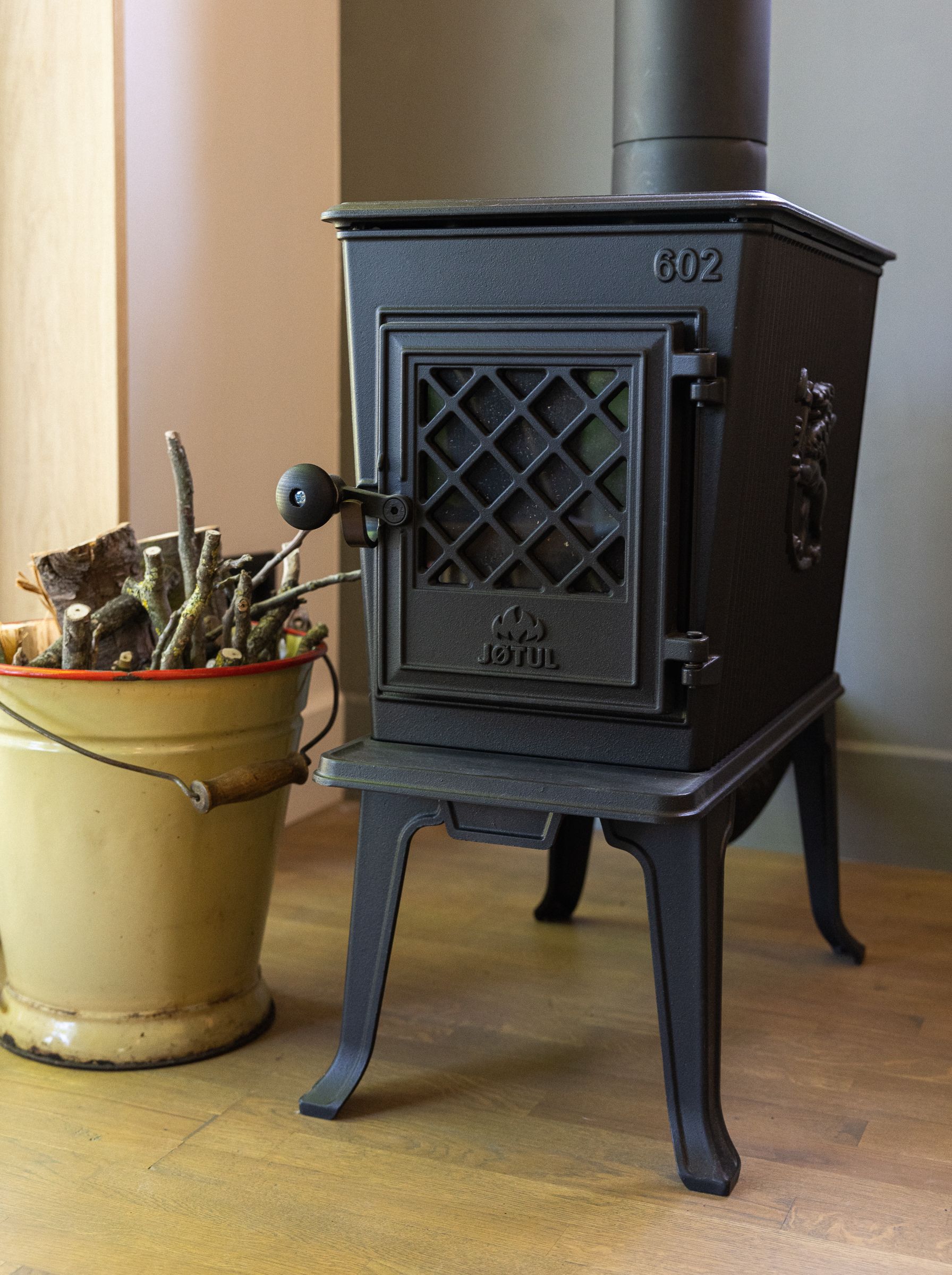
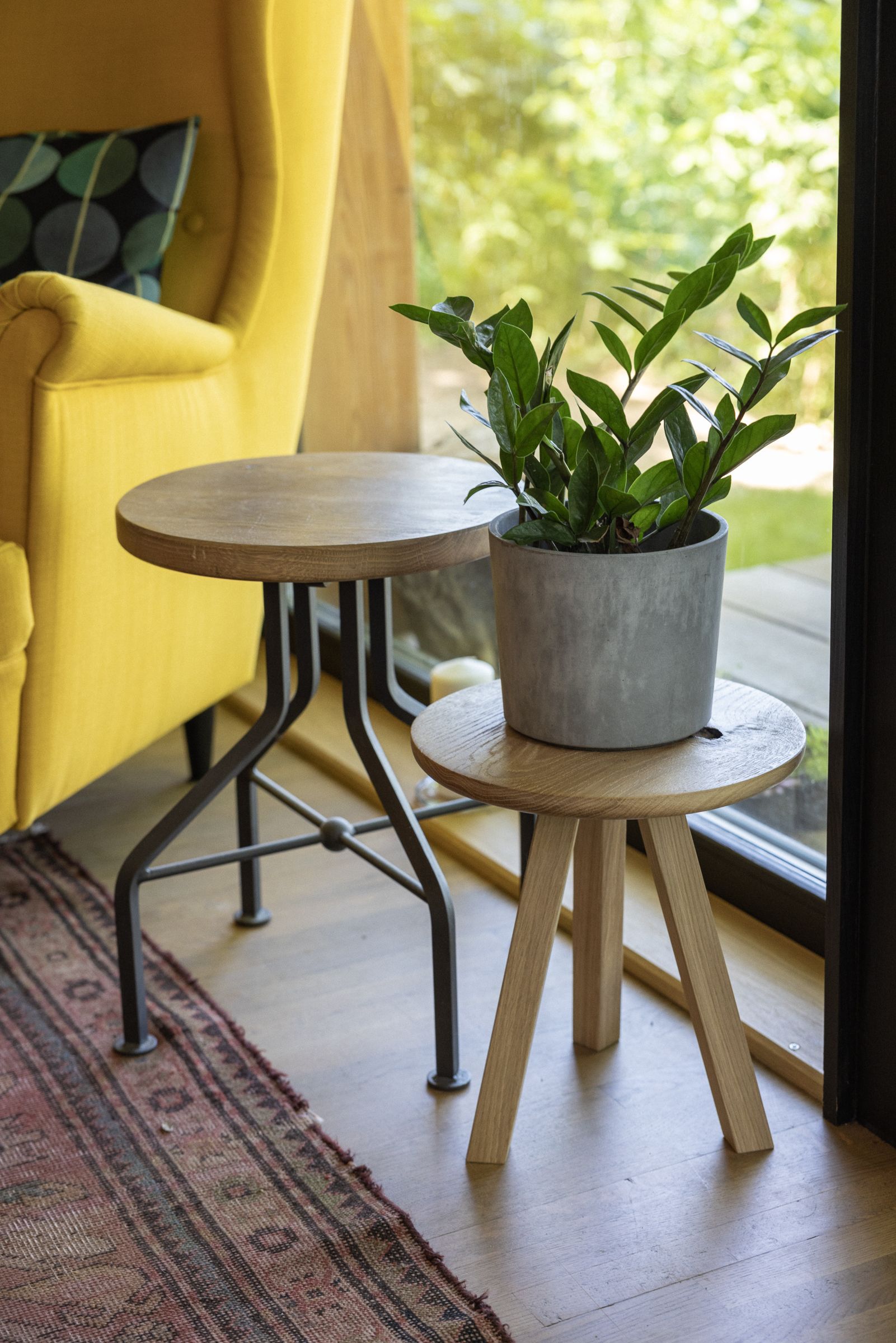
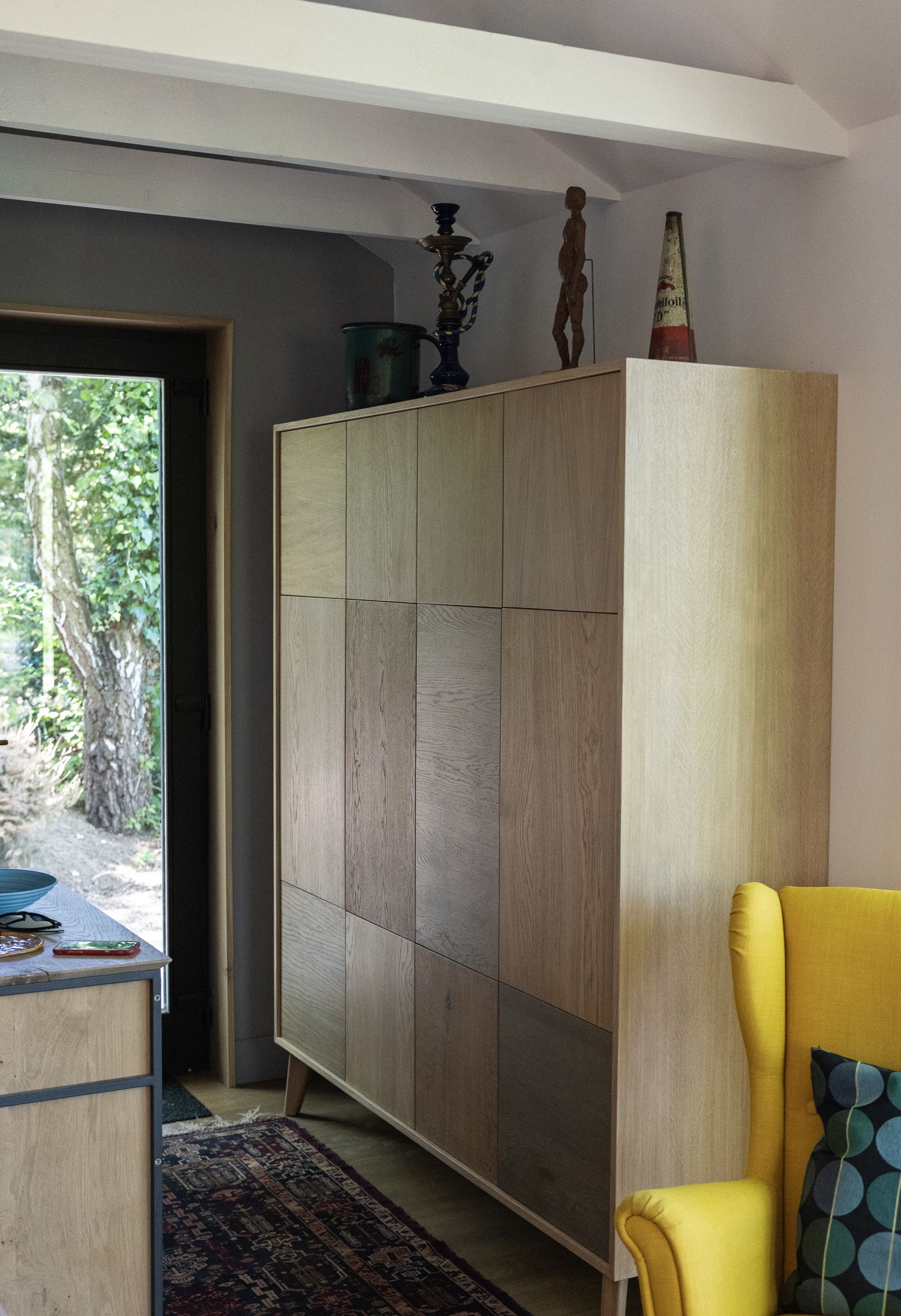
The house is also home to all kinds of artwork: above the dresser in the hallway made by Dávid, there’s a colorful abstract graphics by Ferenc Forrai, and a few objects and paintings by Dávid’s father, Ferenc Pataki, while a print by Imre Kocsis from the 1970s adorns the wall in the bedroom. Also in the hallway is a large, elegant oak cabinet, made even more exciting by Dávid’s use of various oils and stains: each small square-shaped door has a different shade, with flea-market treasures lying on top of it, but there’s also, a larger statue sculpted by Dávid, for instance.
Meanwhile, the refreshing lemonade is served, and we can taste Dávid’s own flatbread with sausages, cheese, and different dips, which don’t escape Zara’s attention, either.
If you’d like to discuss the above-mentioned topics with others and would like to be a part of a great community, join the Piqniq Budapest Facebook group here.
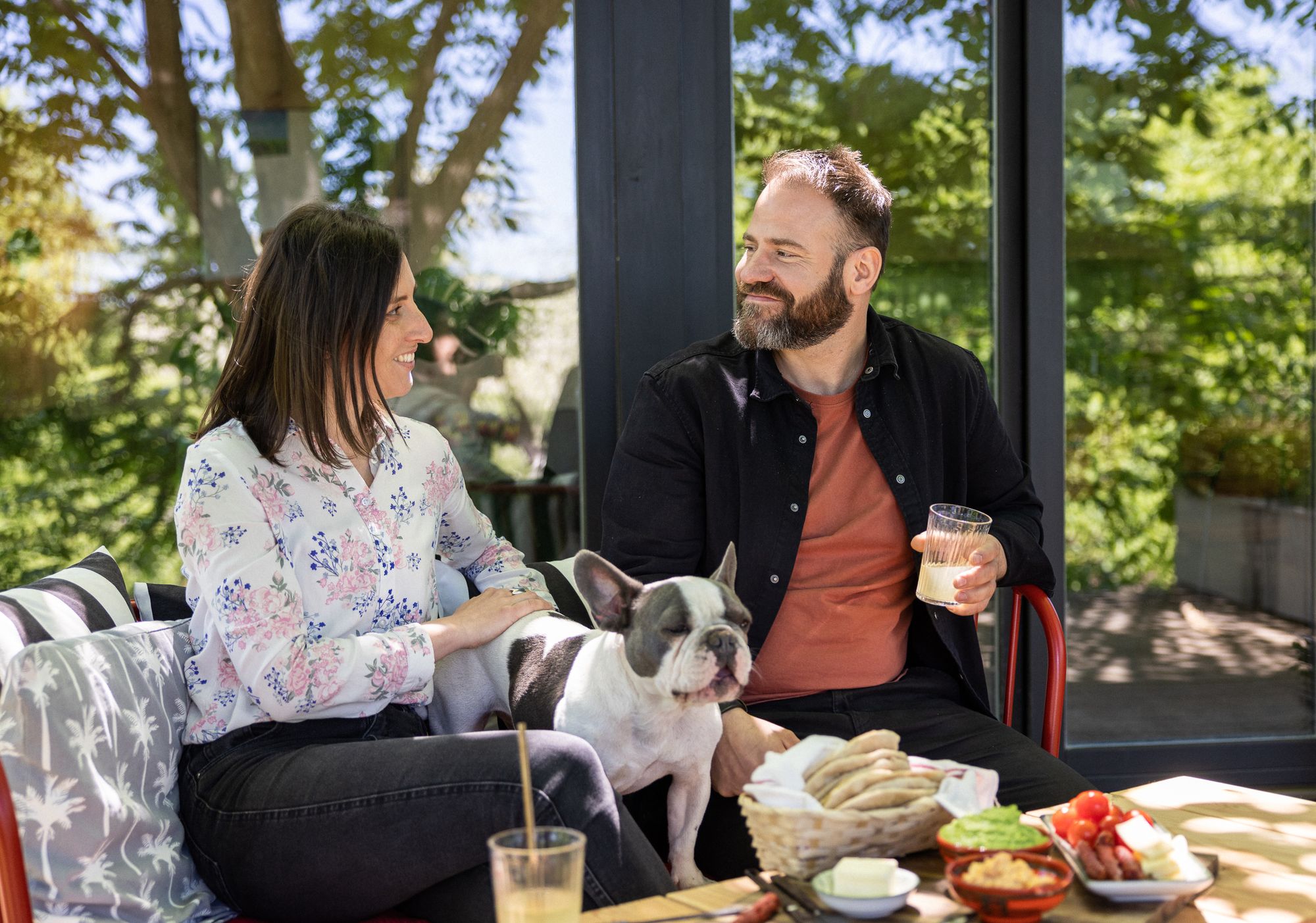
Photos: Balázs Mohai
PDSIGN Studio | Web | Facebook | Instagram

Are the aliens really the greatest threat to mankind in space?
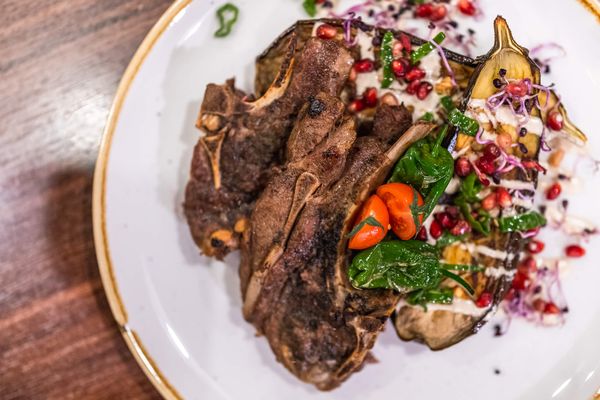
From kosher restaurants to sustainable packaging | Piqniq pack—Part 13
